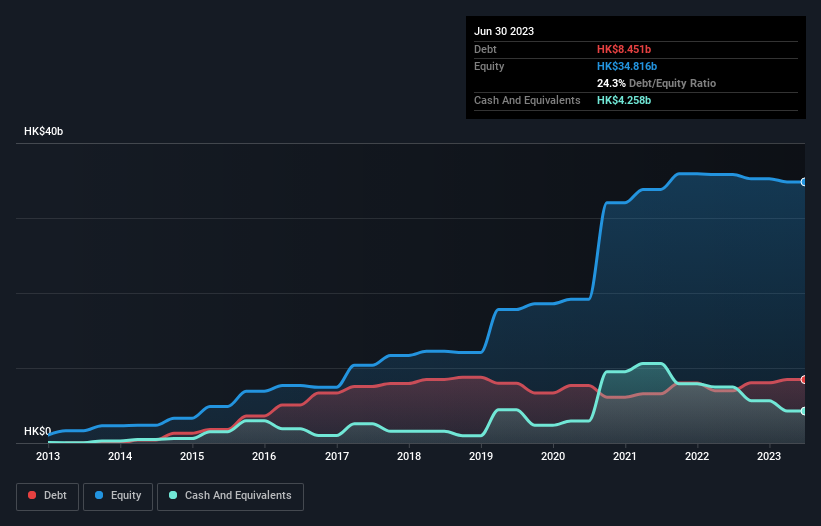Warren Buffett famously said, 'Volatility is far from synonymous with risk.' When we think about how risky a company is, we always like to look at its use of debt, since debt overload can lead to ruin. We note that Xinyi Solar Holdings Limited (HKG:968) does have debt on its balance sheet. But the real question is whether this debt is making the company risky.
When Is Debt Dangerous?
Generally speaking, debt only becomes a real problem when a company can't easily pay it off, either by raising capital or with its own cash flow. If things get really bad, the lenders can take control of the business. However, a more usual (but still expensive) situation is where a company must dilute shareholders at a cheap share price simply to get debt under control. Of course, debt can be an important tool in businesses, particularly capital heavy businesses. When we examine debt levels, we first consider both cash and debt levels, together.
See our latest analysis for Xinyi Solar Holdings
What Is Xinyi Solar Holdings's Net Debt?
You can click the graphic below for the historical numbers, but it shows that as of June 2023 Xinyi Solar Holdings had HK$8.45b of debt, an increase on HK$6.98b, over one year. However, because it has a cash reserve of HK$4.26b, its net debt is less, at about HK$4.19b.

How Healthy Is Xinyi Solar Holdings' Balance Sheet?
According to the last reported balance sheet, Xinyi Solar Holdings had liabilities of HK$14.2b due within 12 months, and liabilities of HK$4.00b due beyond 12 months. On the other hand, it had cash of HK$4.26b and HK$12.0b worth of receivables due within a year. So it has liabilities totalling HK$1.96b more than its cash and near-term receivables, combined.
Of course, Xinyi Solar Holdings has a market capitalization of HK$60.5b, so these liabilities are probably manageable. However, we do think it is worth keeping an eye on its balance sheet strength, as it may change over time.
We use two main ratios to inform us about debt levels relative to earnings. The first is net debt divided by earnings before interest, tax, depreciation, and amortization (EBITDA), while the second is how many times its earnings before interest and tax (EBIT) covers its interest expense (or its interest cover, for short). Thus we consider debt relative to earnings both with and without depreciation and amortization expenses.
Xinyi Solar Holdings's net debt is only 0.65 times its EBITDA. And its EBIT covers its interest expense a whopping 15.6 times over. So you could argue it is no more threatened by its debt than an elephant is by a mouse. But the other side of the story is that Xinyi Solar Holdings saw its EBIT decline by 8.9% over the last year. If earnings continue to decline at that rate the company may have increasing difficulty managing its debt load. When analysing debt levels, the balance sheet is the obvious place to start. But it is future earnings, more than anything, that will determine Xinyi Solar Holdings's ability to maintain a healthy balance sheet going forward. So if you're focused on the future you can check out this free report showing analyst profit forecasts.
Finally, a business needs free cash flow to pay off debt; accounting profits just don't cut it. So the logical step is to look at the proportion of that EBIT that is matched by actual free cash flow. Over the last three years, Xinyi Solar Holdings recorded negative free cash flow, in total. Debt is usually more expensive, and almost always more risky in the hands of a company with negative free cash flow. Shareholders ought to hope for an improvement.
Our View
When it comes to the balance sheet, the standout positive for Xinyi Solar Holdings was the fact that it seems able to cover its interest expense with its EBIT confidently. However, our other observations weren't so heartening. In particular, conversion of EBIT to free cash flow gives us cold feet. Looking at all this data makes us feel a little cautious about Xinyi Solar Holdings's debt levels. While we appreciate debt can enhance returns on equity, we'd suggest that shareholders keep close watch on its debt levels, lest they increase. The balance sheet is clearly the area to focus on when you are analysing debt. However, not all investment risk resides within the balance sheet - far from it. For example, we've discovered 1 warning sign for Xinyi Solar Holdings that you should be aware of before investing here.
At the end of the day, it's often better to focus on companies that are free from net debt. You can access our special list of such companies (all with a track record of profit growth). It's free.
New: AI Stock Screener & Alerts
Our new AI Stock Screener scans the market every day to uncover opportunities.
• Dividend Powerhouses (3%+ Yield)
• Undervalued Small Caps with Insider Buying
• High growth Tech and AI Companies
Or build your own from over 50 metrics.
Have feedback on this article? Concerned about the content? Get in touch with us directly. Alternatively, email editorial-team (at) simplywallst.com.
This article by Simply Wall St is general in nature. We provide commentary based on historical data and analyst forecasts only using an unbiased methodology and our articles are not intended to be financial advice. It does not constitute a recommendation to buy or sell any stock, and does not take account of your objectives, or your financial situation. We aim to bring you long-term focused analysis driven by fundamental data. Note that our analysis may not factor in the latest price-sensitive company announcements or qualitative material. Simply Wall St has no position in any stocks mentioned.
About SEHK:968
Xinyi Solar Holdings
An investment holding company, produces, sells, and trades in solar glass products in Mainland China, rest of Asia, North America, Europe, and internationally.
Excellent balance sheet and fair value.
Similar Companies
Market Insights
Community Narratives




